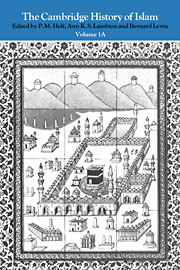4 - The ‘Abbasid caliphate
from Part I - The rise and domination of the Arabs
Published online by Cambridge University Press: 28 March 2008
Summary
The ‘Abbasid dynasty, known to its supporters as the ‘blessed dynasty’, which imposed its authority on the Islamic empire in 132/750, claimed to inaugurate a new era of justice, piety and happiness. Its sovereigns, all members of Muhammad's family, proclaimed that they alone had been designated to lead the community; all of them endeavoured to show, by means of the throne-names which they adopted, that they had the blessing of divine support. This second dynasty of Islam was thus characterized by a new moral trend, though in fact it pursued a policy which differed little from that of its predecessors. Indeed, throughout its period of domination, it suffered the consequences of the circumstances which had raised it to power; it was obliged to face the social disturbances, both economic and religious in origin, which the Umayyad caliphs had exhausted themselves in trying to suppress with their Syrian forces and it was confronted by the same difficulties as the last representatives of the fallen dynasty without having acquired any really new means of resolving them. The prestige of the new rulers was, however, to be buttressed by two tendencies, in some ways contradictory, which continued to become more pronounced over the years: on the one hand by the development of religious feeling, and on the other by the ever-increasing pomp and luxury of the caliphate.
Although linked with their predecessors by the very nature of the loosely constructed imperial state of which they had become the masters, the ‘Abbasids had formerly, during that period of more or less violent disturbances which is usually referred to as the ‘Abbasid revolution, been radically opposed to the Umayyads, whom they regarded as impious usurpers.
- Type
- Chapter
- Information
- The Cambridge History of Islam , pp. 104 - 140Publisher: Cambridge University PressPrint publication year: 1977

